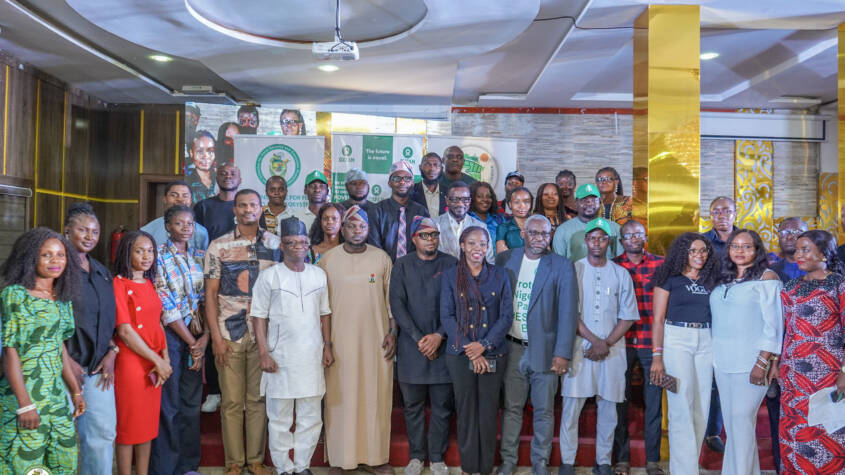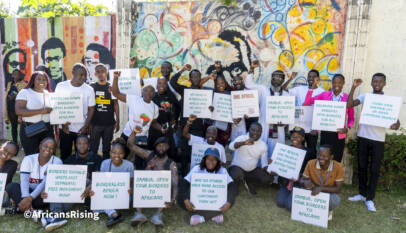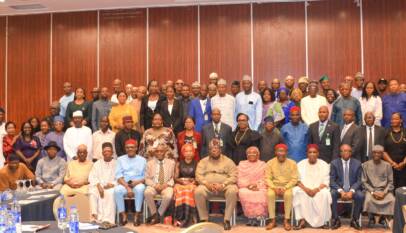Day GIFSEP, Oxfam Honoured Nigerian Journalists Shaping Climate Narrative
Last week in Abuja, Nigeria, the Global Initiative for Food Security and Ecosystem Preservation (GIFSEP) and Oxfam Nigeria hosted the 2025 Climate Media Spotlight Award, recognizing journalists whose reporting has shaped Nigeria’s climate discourse and inspired action.
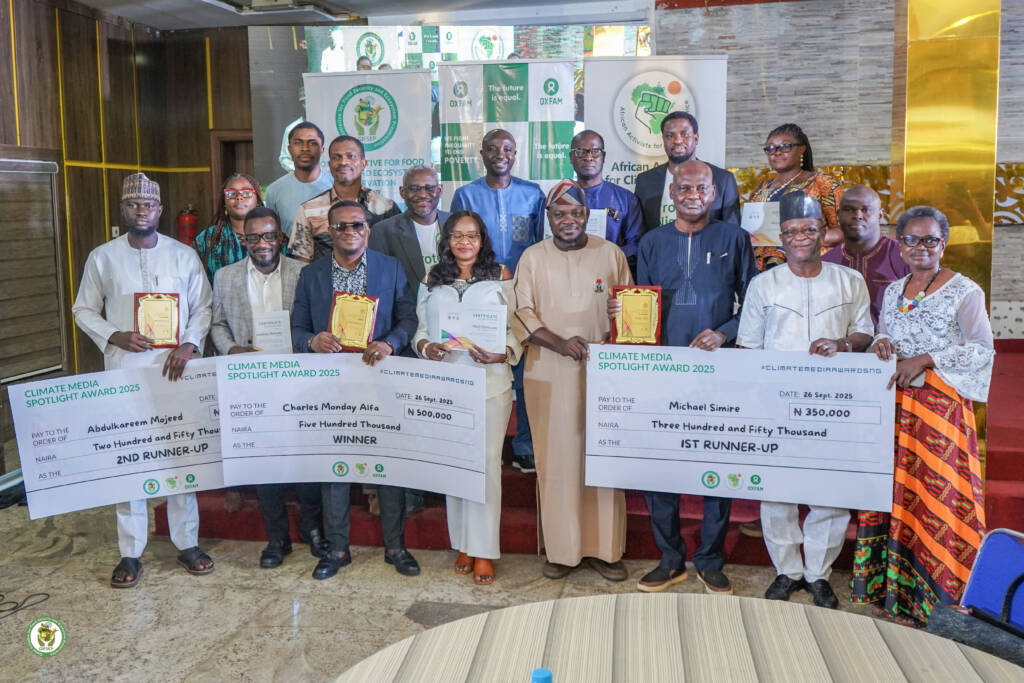
Climate change is no longer a distant concern; it is already reshaping nations—and Nigeria, Africa’s most populous country and largest economy, is also on the frontline. From heatwaves and erratic rainfall to destructive floods and creeping desertification, the signs are unmistakable. In 2022 alone, catastrophic floods ravaged 33 states, displacing over 1.3 million people, submerging farmlands, and crippling critical infrastructure.
Against this backdrop, the media emerges as a powerful catalyst for change. Journalists boast a unique ability to translate complex science into stories that awaken public understanding and spur action. It was this pivotal role that the Climate Media Spotlight Award 2025 honored—celebrating reporters who illuminate the climate emergency and strengthen the press as a driver of climate solutions.
Organised by the Global Initiative for Food Security and Ecosystem Preservation (GIFSEP) in collaboration with Oxfam Nigeria and the African Activists for Climate Justice, the event convened policymakers, media experts, civil society leaders, and climate advocates. Together, they celebrated journalists whose reporting has amplified the urgency of climate action while spotlighting solutions.
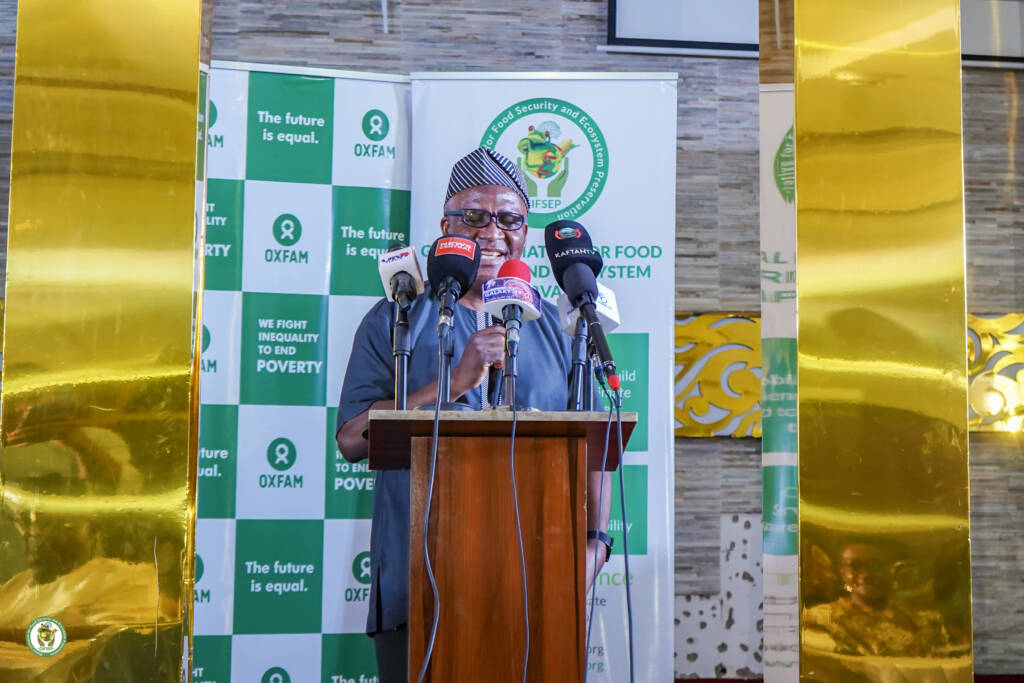
“Media is Pivotal in Addressing Climate Change” – Oxfam Nigeria Director
In his welcome address, John Makina, Country Director of Oxfam Nigeria, underlined the media’s central role in ensuring accurate climate reporting reaches all segments of society.
“Media plays a central role in informing citizens about climate change, its impact, and adaptive strategies. By connecting global phenomena to local realities, journalists make climate change relatable and actionable,” Makina stated.
The Oxfam Nigeria chief, therefore, urged Nigerian media practitioners to ask difficult questions, highlight both risks and solutions, and persist in raising awareness despite climate reporting funding challenges.
“Many flooding incidents are human-made—caused by blocked rivers, settlements on floodplains, and unregulated development that worsen the impact of climate hazards. Citizens must understand their role, follow guidelines, and hold authorities accountable. While policy-driven solutions are vital, awareness, advocacy, and proactive community engagement are equally critical to building a resilient Nigeria,” Mr Makina urged journalists.
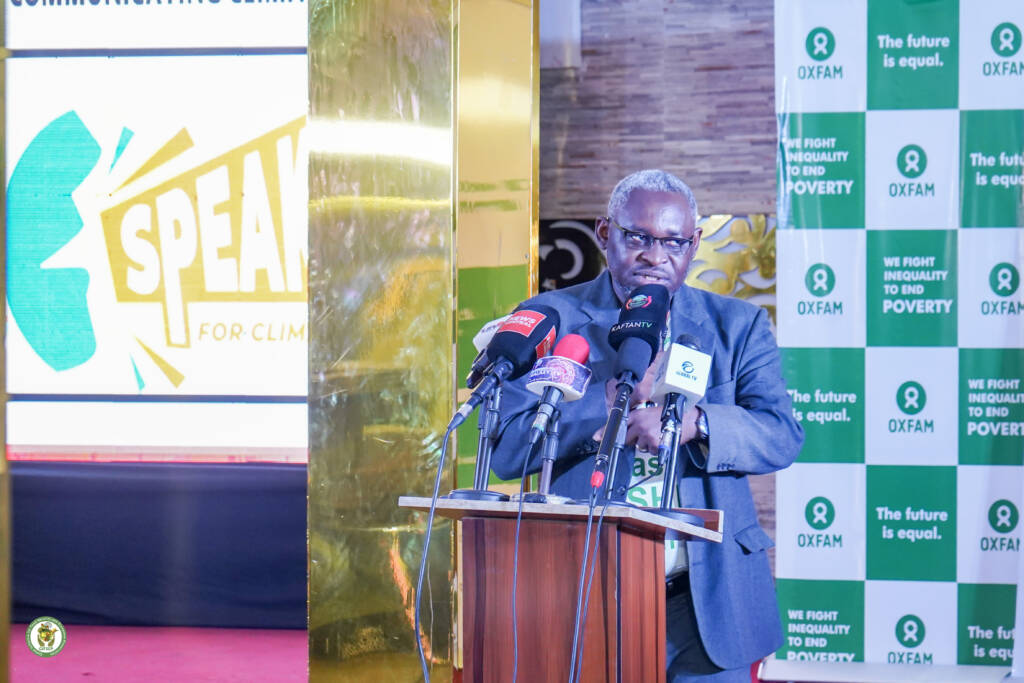
“Climate Journalists Must Focus on Solutions, Not Just Catastrophes” – Dr. David
In his remarks on Communicating Climate Change, Dr Michael David, Executive Director of the Global Initiative for Food Security and Ecosystem Preservation (GIFSEP), stressed that journalists must go beyond events and conferences to engage communities directly.
Dr David urged climate reporters to translate scientific concepts into relatable stories, highlighting both the human impacts and the solutions at hand. “You need strong writing skills, the discipline to research thoroughly, and above all, the ability to connect global climate phenomena to local realities and ensure affected communities are heard.”
The GIFSEP Director also emphasized the necessity for immersive fieldwork and localized reporting. “Do not restrict your coverage to Abuja or other capitals. Travel to places like Benue, Cross River, and Ondo; bring firsthand accounts to the forefront. Local stories matter immensely. The more your audience can relate, the stronger the impact of your reporting.”
He also cautioned against sensationalism: “Many journalists focus solely on catastrophes because bad news attracts attention. But climate reporting must also highlight successes, solutions, and community resilience. The goal is to inform, empower, and inspire action—not to create fear or apathy.”
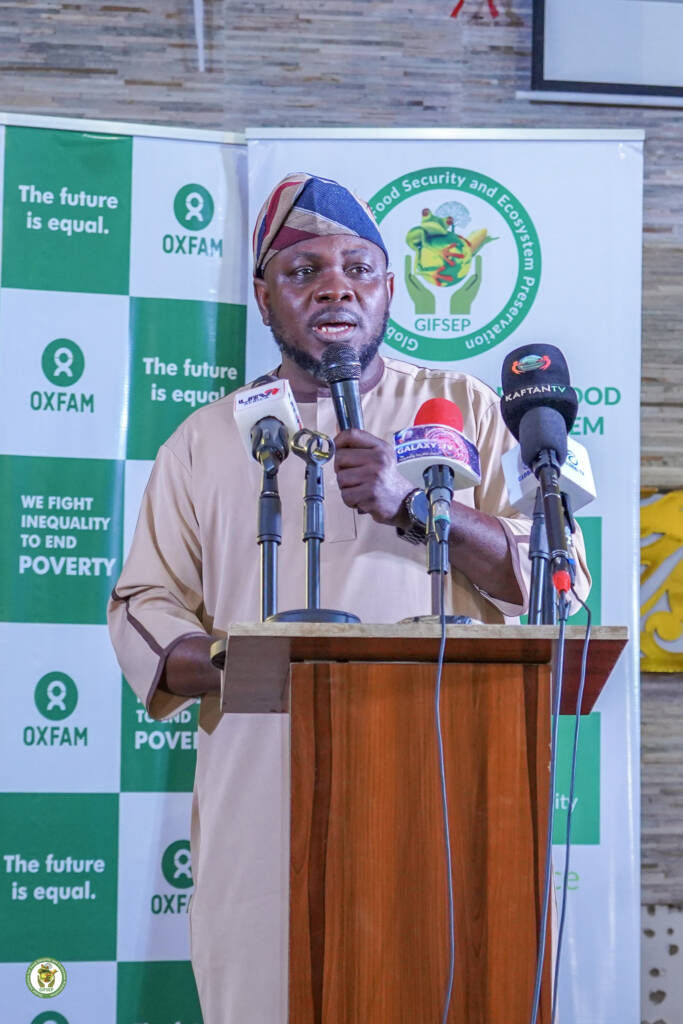
“Climate Change Not Merely an Environmental Issue” – Presidential Aide
In his keynote, Comrade Yusuf Kilani, Special Assistant to the President on Climate Change, stressed the multidimensional nature of climate change, recalling personal experiences that shaped his commitment to environmental advocacy and underscored the role of civil society and government in building effective structures for mitigation and adaptation.
“I have seen the human toll of climate change—floods that swallowed 40% of Lagos, wiping out offices, livelihoods, and entire communities. That devastation pushed me to act, shifting from individual activism to mobilizing young people through initiatives such as climate change clubs in schools, waste-to-wealth projects, and recycling programs. Climate change is not just about science; it cuts across economics and politics,” he said.
Kilani underscored the media’s central role in documenting and communicating the impact of climate events.
“The media shapes public perception and national discourse. Through pictorials, documentaries, and environment-focused reporting, journalists make climate change tangible and relatable—from local flood disasters in Mokwa to environmental challenges in Ogoni.
“By consistently spotlighting these issues, the media drives accountability and pushes for solutions. What we need is everyday coverage, not just periodic features, to build awareness, preparedness, and policy action,” he added.
Kilani further called attention to human responsibility in exacerbating risks by neglecting natural floodplains and environmental regulations.
“Many flooding incidents are human-made—caused by blocked rivers, settlements on floodplains, and unregulated development that worsen the impact of climate hazards. Citizens must understand their role, follow guidelines, and hold authorities accountable.
“While policy-driven solutions are vital, awareness, advocacy, and proactive community engagement are equally critical to building a resilient Nigeria,” Kilani concluded.
“Good Journalism Changes Society; Great Journalism Changes Humanity” – Dr. Akintola
Dr. Olanrewaju Akintola, Director, Department of Climate Change of the Federal Ministry of Environment, praised GIFSEP’s initiative for elevating climate journalism in Nigeria, calling on climate reporters to remain consistent and impactful.
“Climate change is real, and while no single solution exists, adaptation and mitigation are possible through sustained reporting and advocacy. Journalists must pursue excellence with integrity, ensuring their stories motivate both communities and policymakers,” he said.
Dr Akintola applauded GIFSEP’s vision of institutionalizing the annual recognition for Nigerian climate journalists: “Acknowledging exemplary climate reporting builds accountability, inspires new voices, and strengthens resilience.”
“Climate Action Not Tomorrow’s Job; It’s Today’s Responsibility” – Dr. Ojo
Dr. Olumide Ojo, Strategy Director of Propcom+, an eight-year UK Foreign, Commonwealth and Development Office (FCDO)-funded rural and agricultural market development programme, said climate change directly impacts food security.
He warned that rising temperatures, erratic rainfall, and flooding are already crippling Nigeria’s food system, with yields projected to drop by up to 60%. “Climate change is real. Its impacts are not abstract—they threaten food security, livelihoods, and human survival. As citizens, we all must wear the cap of advocacy and campaign for climate justice.”
Dr. Ojo emphasized the media’s power to shape national discourse and inspire policymakers to act: “This recognition is not just an accolade. It is a call to mobilize communities, advocate for climate justice, and lead by example.”
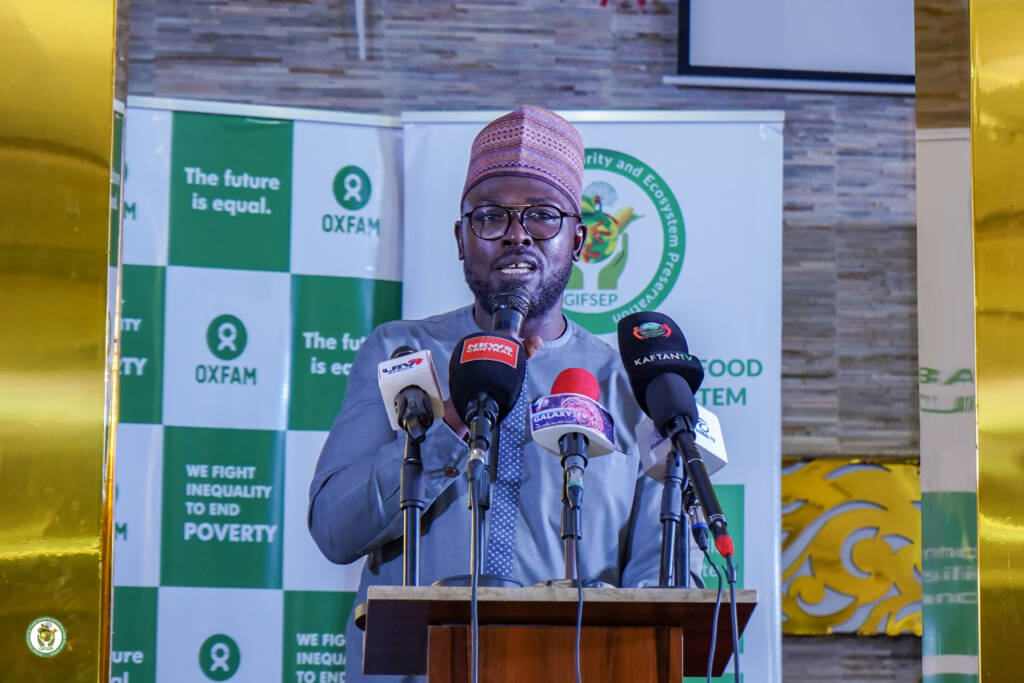
“Misconceptions around Climate Change Hinder Adaptation” – Abdulazeez Musa
CBM Global Disability Inclusion’s Country Director, Abdulazeez Musa, highlighted how misconceptions around climate change hinder adaptation. He recalled incidents of communities sacrificing livestock during droughts and attributing failed rains to divine punishment.
“Mitigation and adaptation are not abstract—they involve concrete actions such as reducing waste, limiting emissions, and planting trees. Even small efforts, like switching off unused lights, contribute significantly,” he said.
Musa urged journalists to humanize climate reporting: “Show how rainfall changes or floods disrupt daily life. By resonating with citizens, the media can drive action and accountability.”
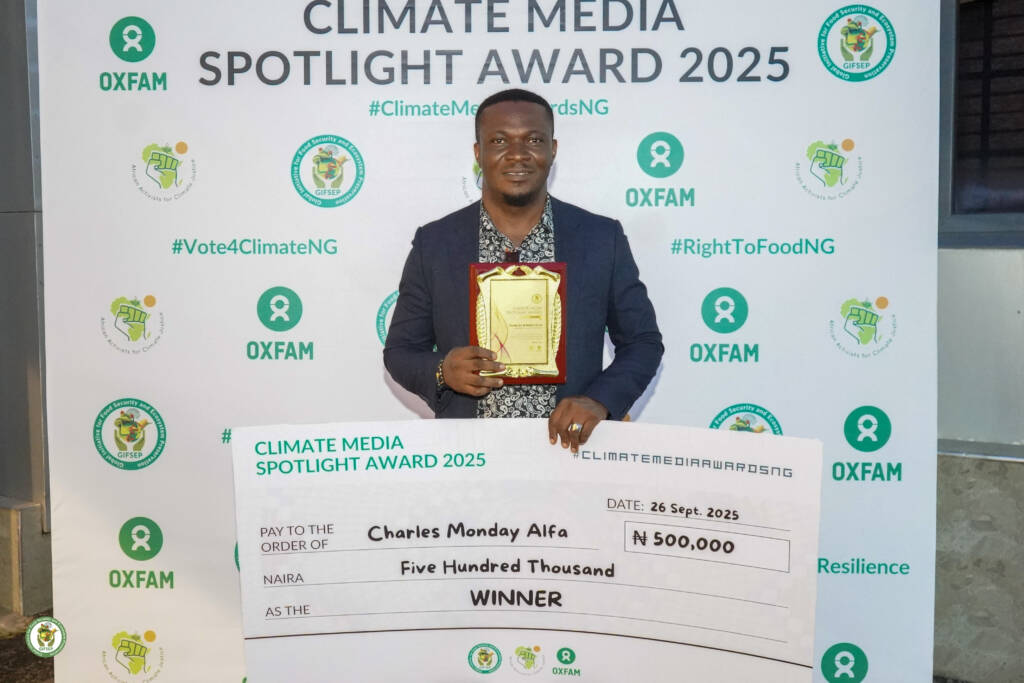
Honouring Trailblazers in Climate Reporting
The award ceremony culminated in celebrating journalists whose dedication to climate reporting continues to shape public understanding and drive meaningful action.
- Charles Monday Alfa of the Nigerian Television Authority (NTA) emerged as the overall winner, receiving ₦500,000 for his outstanding reporting.
- Michael Simire of EnviroNews secured the first runner-up position with ₦350,000.
- Abdulkareem Mojeed of Premium Times secured second runner-up position with ₦250,000
- Each of the 7 other finalists went home with a ₦100,000 cash prize and certificates.
GIFSEP and Oxfam believe the work of the 10 honorees exemplifies the power of journalism to spotlight critical climate challenges, hold leaders accountable, and inspire solutions for a resilient Nigeria.
The 2025 Climate Media Spotlight Award ended with the unveiling of the Nigerian Journalists for Climate Justice (NJCJ)—a pioneering media network initiated to foster collaboration, pool resources, and amplify the voices of journalists driving Nigeria’s climate narrative.

